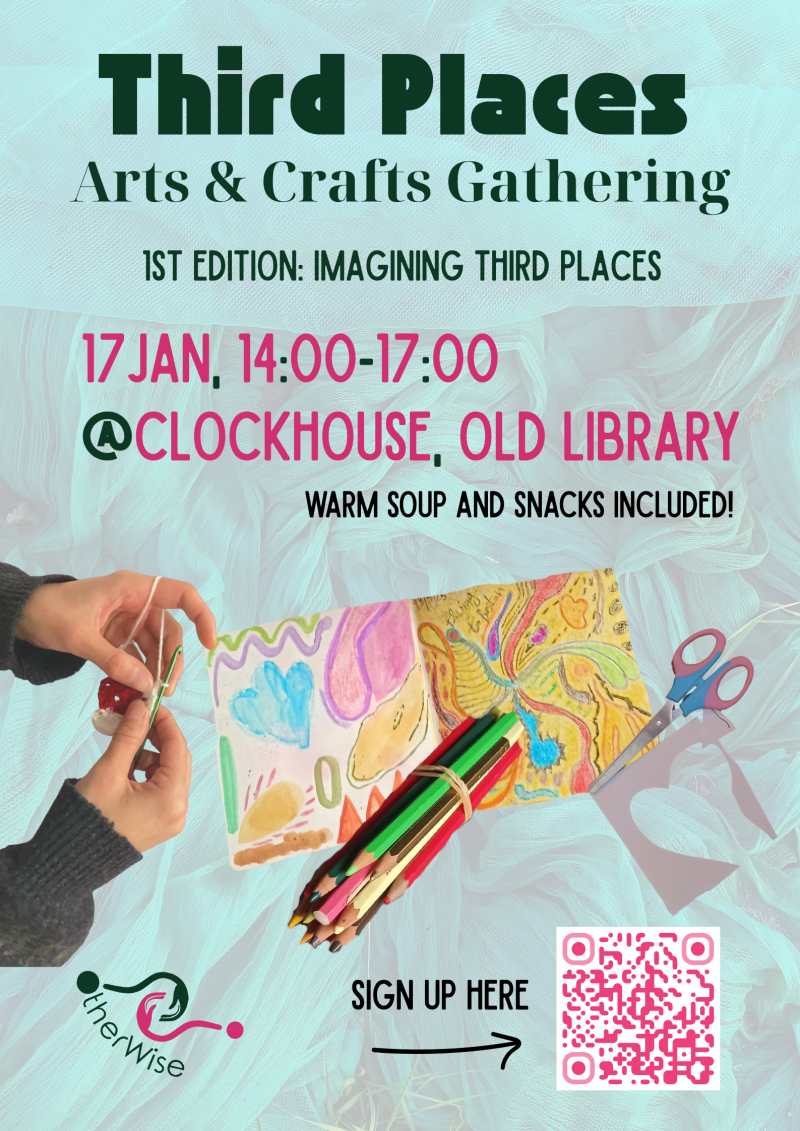OtherWise: a platform for transformative learning
What is needed in response to the world's polycrisis to shift towards justice, liberation, and healing in our communities and beyond? How can we sense, relate, and imagine otherwise?
At OtherWise, we invite participants through creative activities to embody different ways of being and stimulate discussion to politicize topics around sustainability, justice, and social change.

Statement of Solidarity with the Student-led movement for Palestine
We stand in solidarity with the student-led movement on campus to pressure WUR to divest, boycott, and disclose ties with Israeli institutions and companies complicit in apartheid, occupation, genocide, and ethnic cleansing of the Palestinian people. From May until the end of November 2024, students were camping on the bridge between Orion and Forum, while months of negotiation with the Board to end complicity in human rights violations were ignored, downplayed, or defended in the name of 'academic freedom'. We stand behind the students demands and urge the Boards to reorient from hypocrisy and denial towards accountability and justice.
News
We have started the year with launching 'Queer Biology', a Capita Selecta course by students for students, created by Otherwise intern, Lise Gatti. We are also starting a new monthly series 'Third Places', which offers Wageningen a space for arts and political discussion. Another OtherWise course, 'Resistance, Power and Movements' is open for registration on Osiris!
UPCOMING EVENTS
Banner making for the International Working Women's Day
Date: Thursday, 5th of March
Time: 18:00 - 20:00
Location: Old Library at the Clockhouse
March 8th has been established as the institutional celebration of women's rights. But the majority of everyday violence we experience as femininities, trans, and queer people is not relieved by a day granted by the institutions and hijacked by capitalism.
With the ongoing attacks in North and East Syria (Rojava) by ISIS supported by hegemonic forces, this year for the 8th of March, we choose to center the Rojava revolution and the Kurdish Women's Movement in our fight. With the simplest act we want to support our sisters all around the world fighting for liberation.
Understanding the importance of organizing and demonstrating on the streets in Wageningen as well as our position(ality) within the current international situation, we invite comrades to join forces and collectively organize.
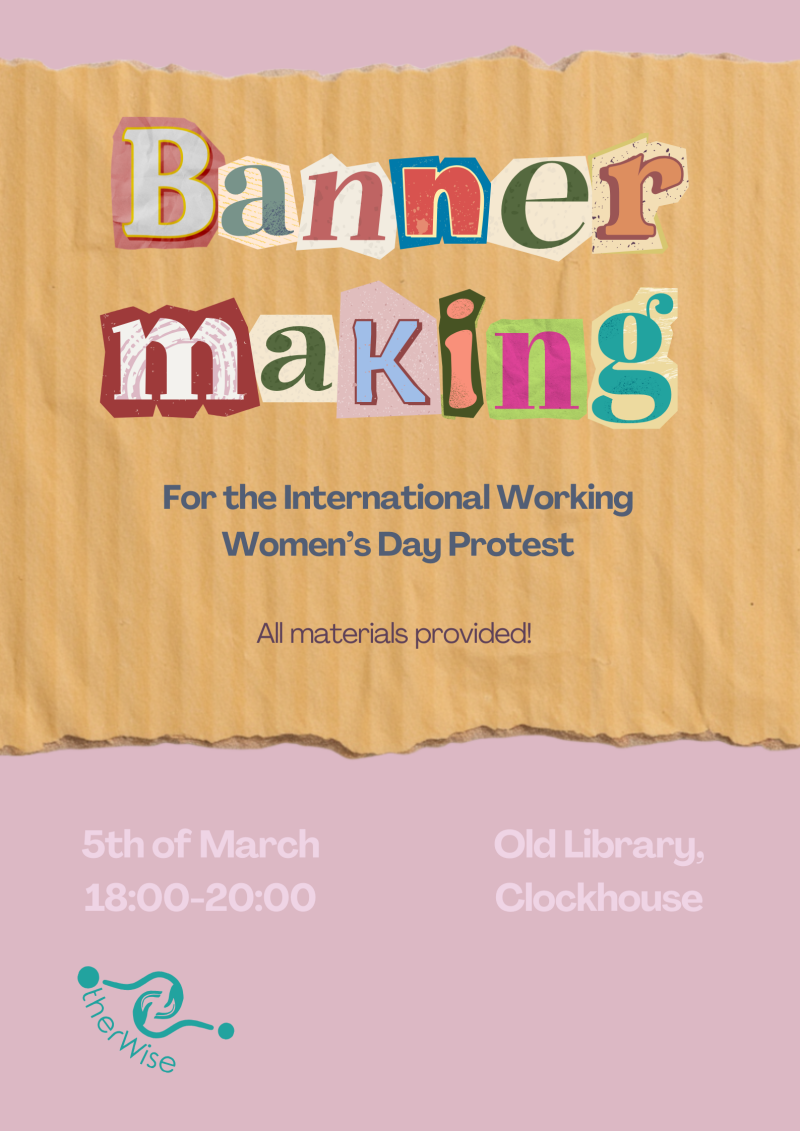
On Thursday 5th of March, we will come together to make signs and banners for the 8th of March protest.
All materials will be provided, but feel free to bring any collage/sheet/cardboard!
See you there,
There is no collective freedom without freedom of the oppressed, without a complete dismantling of patriarchy, colonialism, and fascism.
Rest & Resist Monthly Sessions

Rest & Resist is a new monthly series that aims to be an informal gathering space for all people involved in the Palestine Solidarity Movement, and all movements for liberation!
Born from an initiative of WUR Staff for Justice to support the wellbeing of organisers; students and staff at WUR and all people of Wageningen are invited to be together - to rest and resist. On the first Monday of each month, come hang out with fellow comrades outside of official meetings, talk with new friends, come with your craft project, and drink tea (and sometimes eat soup!).
The next Rest & Resist gathering will be on Monday, March 2 from 6-8 pm in the Old Library at the Clockhouse. Sign up to receive calendar invites and updates, and let us know if you would like to host an evening using this form.
Hope to see you there!
Capita Selecta Course: Queer Biology

This course aims at dismantling many preconceived ideas from the hetero-dominated world of science by putting the spotlight on the overlooked, marginalized, and misunderstood living organisms around us. How remarkable are female Laysan albatrosses, which enter homosocial relationships to raise and defend their chicks, or even protandrous hermaphrodite clown fish, which are born males but can become females upon changing environment.
During this 3 ECTS capita selecta course, we will attempt to redefine sex and to understand its fluidity using teaching from the queerness of the natural world, from animals and fungi, to plants and lichens.
Check out our course guide here !
Sign up for this course at this link or by clicking on the image!
We invite you to the Capita Selecta Course (3ECTS):
Queer Biology (GEO51083), held in Periods 3 and 4.
Overview of the course:
Queer biology is an interdisciplinary approach that applies notions from queer theory and queer ecology to biology. It aims at deconstructing the binary, heteronormative, and anthropocentric narratives that have shaped and prejudiced the teaching of the natural world. In that sense, behaviors that do not conform to our societal conventions are termed abnormal and directly excluded from research, relentlessly conforming nature to patriarchal values. Altogether, these outdated research frameworks fail to explore the importance of queer behavior and how such interaction shapes the ecology around us and within us.
Good to know!
Kraak Het Krediet Festival
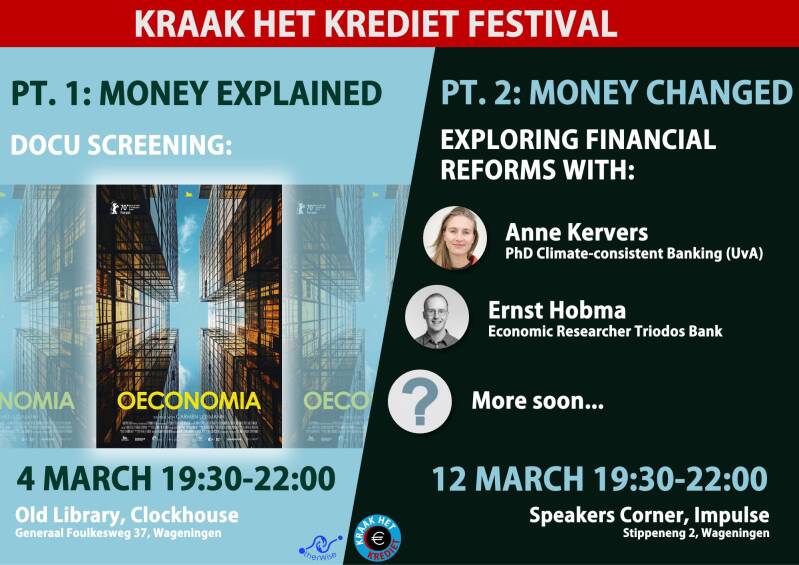
💸 Kraak Het Krediet invites you for two exciting events in the upcoming weeks.
Part 1: Money Explained
Join us for a screening of 'Oeconomia' (2020) which explores the fundamental architecture of financial capitalism. The documentary critically delves into the European monetary & financial system, addressing money creation & allocation, perverse power relations, and growing societal inequalities. Are you curious to see how commercial bankers create new money out of thin air with a mouse-click? Then we warmly invite you to attend this screening!
Date: Wednesday 4 March 19:30
Location: Old Library, Clockhouse, Generaal Foulkesweg 37
Part 2: Money Changed
The current monetary & financial system serves a problematic purpose: facilitating perpetual capital accumulation. During this engaging seminar, we will explore how the monetary & financial system can be transformed to facilitate a society which is relationally embedded within social justice, ecological sustainability, and deep democracy. More information about the speakers soon :)
Date: Thursday 12 March 19:30
Location: Speakers Corner, Impulse, Stippeneng 2
Agroforestry Design Challenge 2026
Are you curious about agroforestry as a regenerative form of agriculture? The Regeneration Foundation is organizing the Agroforestry Design Challenge. From March through September, they will cover the design of agroforestry and regenerative food communities in monthly sessions and workshops. This course is designed for young people between the ages of 18 and 30 who want to contribute to a regenerative future. Perhaps as a farmer, policymaker, or entrepreneur in the food sector. All links in the sector are needed to transform the food system. In this course, you will learn about the various aspects of agroforestry within regenerative agriculture, from cultivation and ecology to marketing, processing, and legislation. By designing a real-world case study, you will learn to connect the various links. The course starts on March 21. For more information, visit www.stichtingregeneratie.nl/educatie/agroforestry-design-challenge-2026/ or register directly via https://forms.gle/GSDi9aiJRWZLcKjt6 .


Freedom Tours Wageningen
We're excited to share that Freedom Tours Wageningen welcomes you to their interactive, guided walking tours, inviting you to explore the city of Wageningen through a critical lens!
Message from the team:
Hi there! We are the Freedom Tours Wageningen team. In collaboration with Wageningen residents, we co-created an interactive 2-hour tour that explores Wageningen through the lens of freedom, gender and sexuality. Guided by locals, participants hear personal stories, share reflections, and engage in open dialogue rather than passive observation. The tour explores lived experiences, social concerns, and community aspirations.
We invite you to:
- Join a free monthly walk 'Freedom through the lenses of gender and sexuality' — or invite others to join! The next free tour is on December 13 2025 - Please register at this link
- Subscribe to our newsletter to stay informed about future tours, events and co-creation opportunities
- Join our WhatsApp Community for regular updates
More tours to come!
Can't make it on 13 December 2025? No problem! We will be offering free tours on a regular basis over the next year. Sign up for the newsletter and follow us on social media for updates on future tours. You can also book a paid tour for your group during the year.
Join!
Our 'Freedom through the lenses of gender and sexuality' route is the first in what we hope to make a recurring, community-based tradition — one that invites new voices every year and contributes to shared understanding through storytelling and dialogue. A tour focusing on disability and accessibility will be launched in 2026. Stay tuned!
Do you have any ideas? Contact us — we are happy to think along with you!
Bsc Minor: Gender & Diversity for Sustainable Worlds
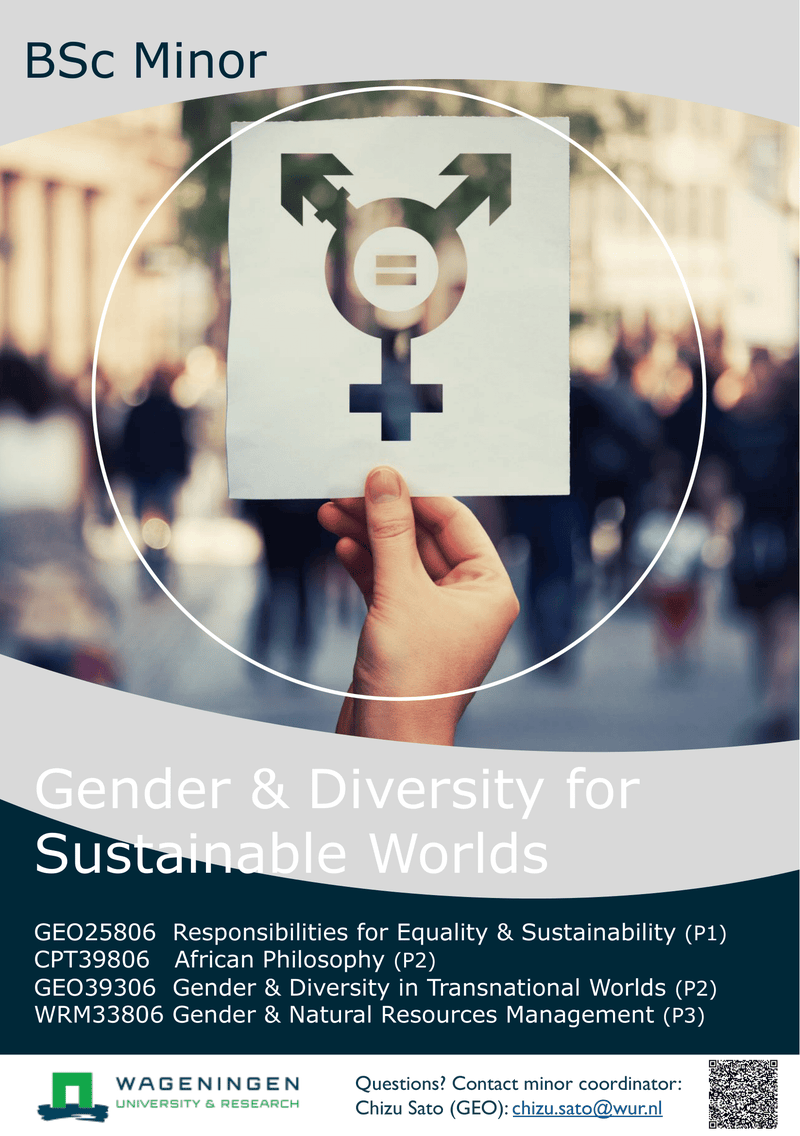
Coming September, we will be running this minor for the third time. The minor's courses offer interesting and challenging learning environments that fit with Otherwise's interests and ambitions. Students previously have been very satisfied with the courses and the minor . More information can be found here
The minor consists of the following courses:
GEO25806 Responsibilities for Equality & Sustainability (P1)
CPT39806 African Philosophy (P2)
GEO39306 Gender & Diversity in Transnational Worlds (P2)
WRM33806 Gender & Natural Resources Management (P3)
The minor kicks off with a course on 'Responsibilities for Equality and Sustainability' which offers real-life contexts where students learn about and then see the operation of their position, the value of diversity, and how these shape professional responsibilities and opportunities to contribute to a more equal and sustainable world.
Past Events
Third Places-Arts & Movement Gathering
2nd edition: Embodying Rhythms of Resistance
Date: Saturday, 21st of February
Time: 14:00 - 16:00
Location: The Dance Room, at Clockhouse, Wageningen
Dear OtherWisers,
The second edition of the Third Places series is here, and this time we're moving.
After your suggestions from our last gathering, this edition brings dance and rhythm while engaging the body as a political site.
In “Embodying Rhythms of Resistance”, we are exploring Afro-Brazilian dance and music as forms of grassroots cultural resistance.
We'll focus on Samba and may also dip into Brazilian funk and learn a bit about their history, how their rhythms feel in our bodies, and talk about how dance can be both a form of resistance and pleasure.
No dance experience needed, just curiosity and openness to learning, listening, and moving together.
See you there!

Film screening & Discussion: All the Beauty and the Bloodshed

Date: Wednesday, 18th of February
Time: 19:00-21:30
Location: Forum, B0217 (second floor)
All the Beauty and the Bloodshed (2022) is a US American biographical documentary film about photographer, artist, and activist Nan Goldin.
Nan Goldin, celebrated photographer and opioid crisis activist, reflects on her life through slideshows, interviews, and archival footage. From her formative years in New York's art scene to her present-day campaign against the Sackler family, she traces her evolution as both artist and advocate.
The film will be followed by a small discussion.
See you there!
What's Love (got to do with it)?: Creative and Critical Discussion Circle on Love

Date: Saturday 14 Feb
Time: 2:00 PM - 5:00 PM
Location: The Old Library at the Clockhouse
On Saturday, the 14th of February, many people celebrate Valentine's day. A day, we are told, to celebrate love. Valentine's day's origins are linked to pagan Lupercalia, a festival for purging and fertility that purportedly involved whipping people and animal sacrifice. Then came a Christianized version that celebrates the martyrdom of Saint Valentin (who was executed for secretly married persecuted Christians who were prevented by law from marrying). Finally, we have today's multi-billion dollar industry that tells us to buy chocolates, flowers and exploitatively mined gemstones for our lovers to show that we care. Basically, this is a story that has very little to do about love.
But love is worth celebrating. What's love? Which love? Whose love? Where is the love?
On the 14th of February, join us at the Clockhouse to think, share and dream about a love worth celebrating - a love that lies beyond the dominant narrative. A love that is radical, revolutionary, and real, a non-heternormative, queer love, platonic love and a self-love, a love for nature, an other-worldy type of love. A love that transforms you and a love that makes you see yourself and the world around you more clearly!
We ask you to bring a story, a poem, a paragraph of a book, a picture, a theory, a drawing, a song, a movie clip, an object - or anything - that represents this type of love to you, or helps you feel this type of love! This will be a show&tell style discussion circle to breathe life into the love we want to see and feel.
You are invited to join to share and listen to stories of love otherwise❤️
Celebrating 5 Years of Resistance, Power & Movements:
Interactive Afternoon on Activism & Academia
📅 When: February 12, 1:30 PM – 6:00 PM
📍 Where: The Clockhouse, Generaal Foulkesweg 37 in Wageningen
💡 What: Strengthening the relationship between academia and activism through inspiring talks and creative workshops
Dear friends of the Activist Academy,
The program for our celebration of five times Resistance, Power, and Movements has been finalized! We invite all of you to join us for an afternoon of serious discussion, creativity, and party. Click here to register.
Why celebrate?
Seven years ago, we, a group of scholars, activists, and students, began to dream about a course that would not only encourage critical thinking but also equip students with the tools and skills to engage with urgent global challenges such as the climate crisis, racism, and conflict. We started to explore how university teaching could become a space where theories about and practices of social movements would inform one another, and how to bring that spirit into the lecture room.
In 2019, we were ready to launch Resistance, Power, and Movements for both undergraduate and graduate students across disciplines. Five editions later, the course has grown into a careful, collaborative space - an act of resistance in itself - where lecturers and students learn with and from each other about resistance, power, and movements, and where there is space for care, slowness, and reflection.
Time to celebrate and explore future pathways together!
Film Screening: Yuturi Warmi
at Now The Future
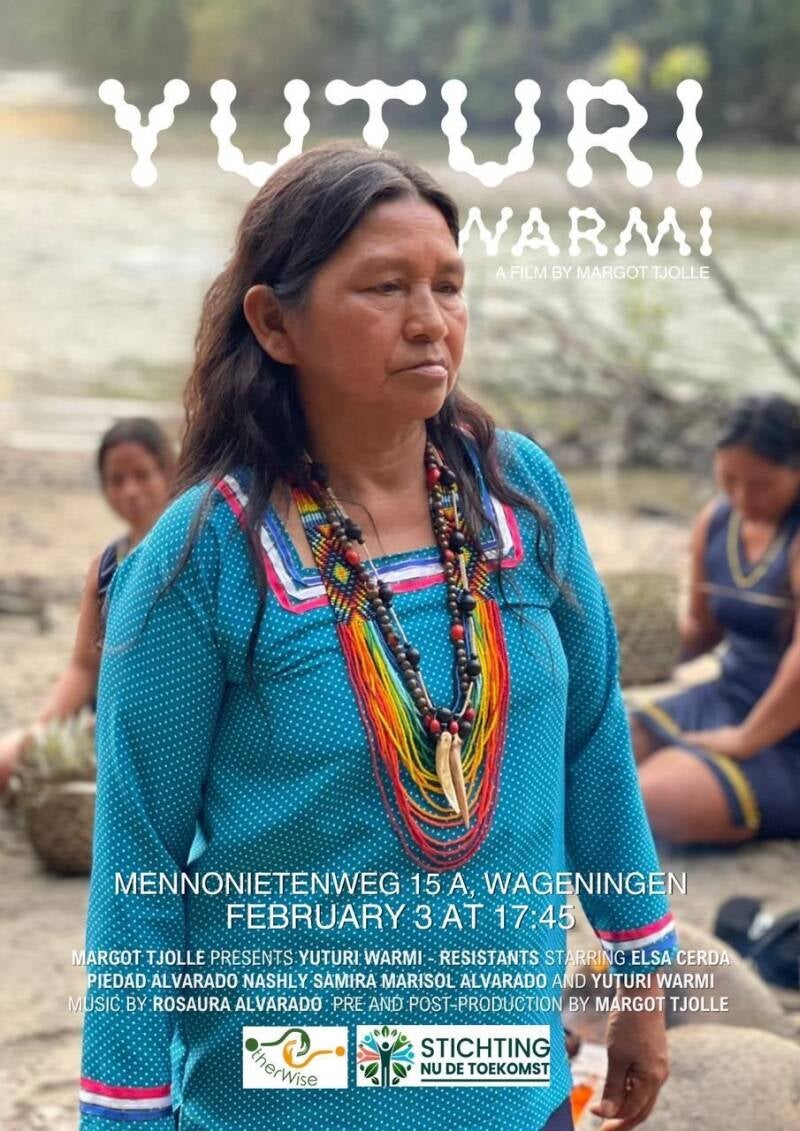
Date: Feb 3
Time: 17:45 - 19:00
Location: Now The Future, Mennonietenweg 15A, Wageningen
Yuturi Warmi – ResistAnts immerses us in the Ecuadorian Amazon, where Indigenous Kichwa women — the Bullet Ant Women — rise to defend their territory from the gold rush consuming their future, forests and rivers. Through the lens of embodied resistance, the film captures their courage, their laughter, and their dreams of autonomy rooted in ancestral knowledge and feminist solidarity. As they patrol, protest, and create, their struggle becomes a song of survival and renewal — a call to reimagine coexistence beyond extraction. Born from a collaboration between filmmaker Margot Tjolle and the Serena community, the film is both about resistance and relationship.
By open 5:45 PM. The screening is from 6:00 PM and will be followed by a Q&A with the director. Afterwards there is donation based community dinner so please bring some cash :)
Third Places - Arts & Crafts Gathering
1st edition: Imagining Third Places
Dear OtherWise community,
We are starting 2026 with a whimsical, artsy mingle in our cozy Old Library at the Clockhouse, next to the Arboretum garden. As winter afternoons invite us to relaxing artistic activities, we created the "Third Places-Arts & Crafts Gathering" series. With the hope of creating a warm communal space, this series will follow a diverse range of themes, aiming to spark discussions, debates (why not?), and reflections while expressing ourselves through art.
For our first gathering, we invite you to contribute to a collective artwork. Together, we will explore the theme of "third places" by creating a collaborative, visual, map-like piece of art.
The concept of Third place was defined by Oldenburg (1989) as “a generic designation for a great variety of public places that host the regular, voluntary, informal, and happily anticipated gatherings of individuals beyond the realms of home and work.” These places contribute to the creation of an environment where people meet regularly and affordably, and where means of relaxation and leisure are shared.
Third places promote grassroots politics, social interactions, sharing, and play, opposing concepts such as productivity, privatisation, and commodification.
At OtherWise, we want to foster connections, discussions, creativity, and the imagination of 'other ways of being'.
During the gathering, everyone will be invited to explore the theme and create art using different media. The creations may look like drawings, collages, textures, or words reflecting questions such as:
What does a third place look like, feel like, or offer to you?
Join us to make art, share stories and food, and co-create an OtherWise third place.
When: Saturday, 17th January, at 2:00 PM - 5:00 PM
Where: Clockhouse, Old Library, on the 1st floor ( General Foulkesweg 37, 6703BL, Wageningen)
Hot vegan soup and snacks included!
Sign up for this course at this link or by clicking on the image!
Documentary screening: Jiyan's story
Come join us for a cozy movie night and some warm tea!
We will watch a documentary following the story of Jiyan, a guerilla fighter in Rojava womens revolution. Rojava is an autonomous region in Northern Syria renowned for centering eco-feminism and alternative forms of governance. Jiyans Story sheds light on the need to struggle against both the state and patriarchy to create a just future.
When: Friday, Jan 9, 19:30
Where: De Superette, Olympiaplein 26, Wageningen
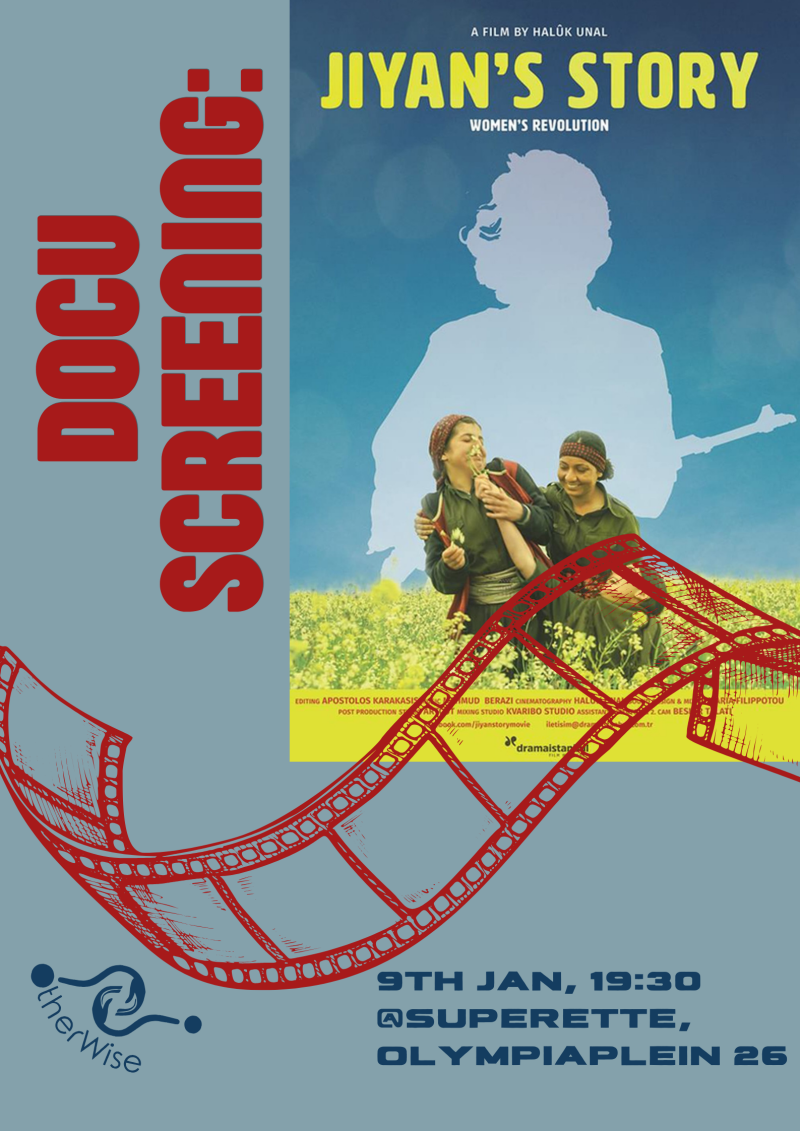
River Defenders Gathering
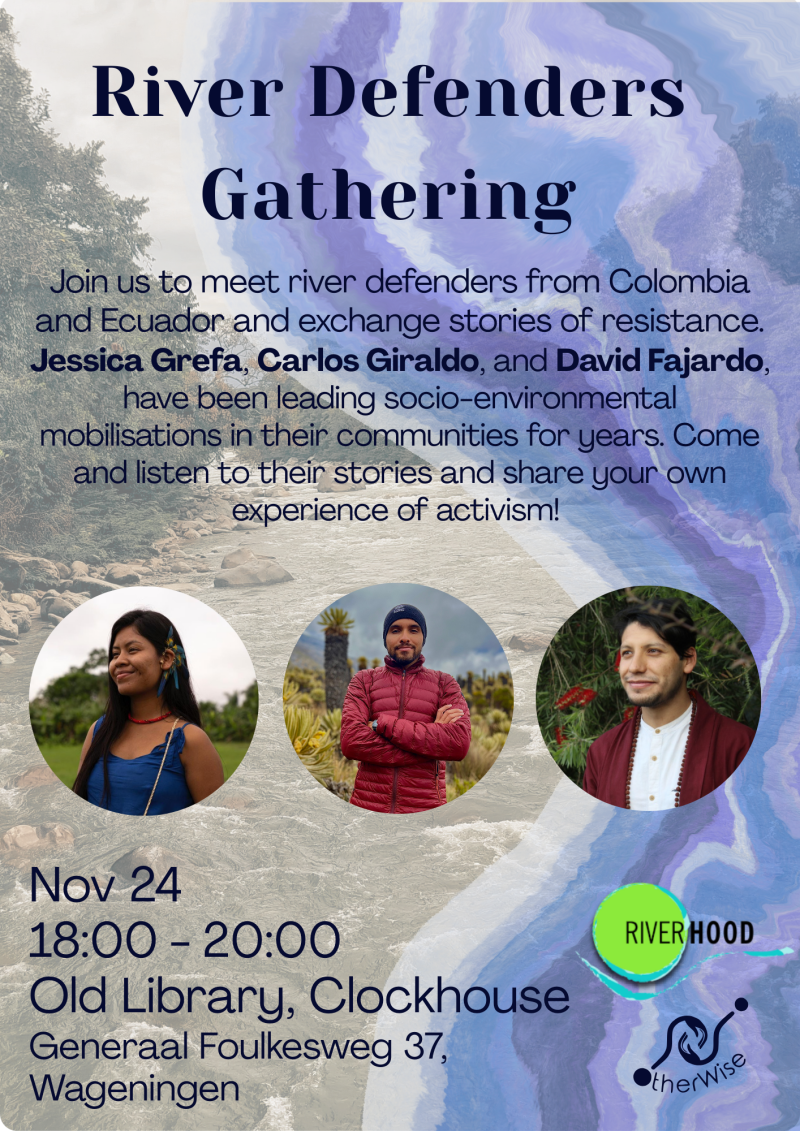
The activists are:
Jessica Grefa – Río Piatúa, Ecuador. Kichwa biologist and young leader of Piatúa Resiste, a youth movement that arose in defence of the Piatúa River, in the Ecuadorian Amazon rainforest, opposing a hydroelectric dam project.
Carlos Giraldo – Río Arenal, Colombia. Young activist researcher from the peasant community of the Arenal River, in Antioquia, Colombia. Founder of the organisation Somos Del Río, which organises public debates and workshops for environmental education, with the goal of impacting environmental policies for the protection of rivers.
David Fajardo – Cabildo por el Agua de Cuenca, Ecuador. Young environmental activist, member of the socio-environmental activist organisation Cabildo por el Agua de Cuenca Cuenca, organiser, and lawyer who works with Rights of Nature and the rights of Indigenous Peoples in Ecuador.
Date: November 24
Time: 18:00 - 20:00
Location: Old Library, Clockhouse, Generaal Foulkesweg 37, Wageningen
This November, 3 young River Defenders from Ecuador and Colombia are coming to the Netherlands to share about their stories, struggles, and movements. These activists, Jessica Grefa, Carlos Giraldo, and David Fajardo, have been leading socio-environmental mobilizations in their communities for years. You are invited to join a Sharing Circle at the Old Library, in the Clockhouse, on the 24 November from 6pm to 8pm to meet them, learn about the river territories they are defending, and exchange stories of activism and resistance in the movements in which you participate! This is an opportunity to share experiences of activism and mobilizations for life across cultures and geographies!
Positionality Circle: Exploring your Identities
Date: November 20
Time: 5:00 PM - 8:00 PM
Location: Old Library and Dance Room at the Clockhouse (Generaal Foulkesweg 37, Wageningen)
Join us for an evening dedicated to exploring your position as a scientist in the WUR in new ways. We'll examine the identities you are assigned or ascribed by society, community, family, WUR and the identity you yourself design, adapt, and adopt. We will explore these forms of identity in two parts over the course of one evening with experienced facilitators, and a dinner included! By the end of the evening, you will have thought deeply about your own responsibility to the agency and power you yield.
Sign up link:
https://forms.gle/9ExW2owqnFgnTEeE7

Workshop: Listening beyond your bubble

Date: November 8
Time : 11:00 – 15:30pm
Location : KenKon, Nieuwe Kanaal 11, Wageningen
Facilitators : Annick Nevejan, assisted by Ania Ektate
This workshop is a teaser event for the upcoming core-training in Spiritual Ecology, made possible by Spiritual Ecology Netherlands, Spectrum, and OtherWise. The event is free of charge, but donations are very welcome.
Curious about our work? visit www.spiritualecology.nl for more information.
The present situation in our world leaves us entrapped in our bubbles, lonely and craving for connection.
We often suffer from a feeling of disconnect, where we kind of close off from the stream of life like living in a bubble with predictable habits and thought patterns. This protection mechanism makes us at times quite lonely. We forget to open the window and allow a new breath of fresh air to come in. This workshop gives you practical tools to reconnect and to find your own way to open that window for a new delight.
The term resonance was developed by German sociologist Hartmut Rosa. She stated that meaning does not arise from utility, power, control, or success, but from our relational connection with the world—when the world responds, when something resonates.
According to Rosa, resonance is a relational experience in which we feel touched by something outside ourselves—a person, a landscape, a work of art, a response to a letter. Resonance is a two-way street: we speak and the world responds. This is different from harmony, happiness, or recognition; it is an experience of meaningful reciprocity.
With this workshop we will explore different ways of listening – playfully, deeply, compassionately – to ourselves, in relationship with others and nature. Listening we do in the 'here and now', with our whole being. It creates the condition for 'resonant connection', a meaningful reciprocity with our inner and outer world.
Workshop: Conflict Mediation & Internal Dynamics
Date:6 November
Time:17:00 - 20:00
Location: Old library, Clockhouse (Generaal Foulkesweg 37, Wageningen)
What dynamics lead to conflicts and harm in our groups? And how do we deal with them? Come to learn how to make our groups and organizations more sustainable.
In our resistance against oppressive systems, we are not only met by external pressures but also by internal ones. Conflicts are part of our lives and organizing,yet we often have very little experience and knowledge on how to deal with them. So we quickly find ourselves in emotionally intense conflicts that break up our groups and lead to burnout. And at the same time, we find little ways on dealing with harm done internally, which either leave us with a repetition of the same harm or push the harm somewhere outside of us.
In this activist academy session, we will dive into conflict resolution via analyzing what dynamics contribute to conflict, and what different ways there are to deal with conflict, from changing our group cultures to mediation techniques. We will do this via exercises, small and big group sharings, and input from the facilitator.
Register (max. 25 people): https://cryptpad.fr/form/#/2/form/view/ZyQtnLFHZkr8Q7X-ISmhDzZwFqfg2mHWuwB79oXurzw/
For whom? students, staff, and people outside of the university who support or are part of activist movements.
Queer Biology Kick Off
Date: 5 November
Time: 18:00 - 20:00
Location: Gaia Plateau, Droevendaalsesteeg 3, Wageningen
This January and February, OtherWise will launch the Capita Selecta course Queer Biology. Queer biology is an interdisciplinary approach that applies the conceptual framework from queer theory and queer ecology to biology. It aims at dismantling the binary, heteronormative, and anthropocentric narratives that have shaped and prejudiced the teaching of the natural world.
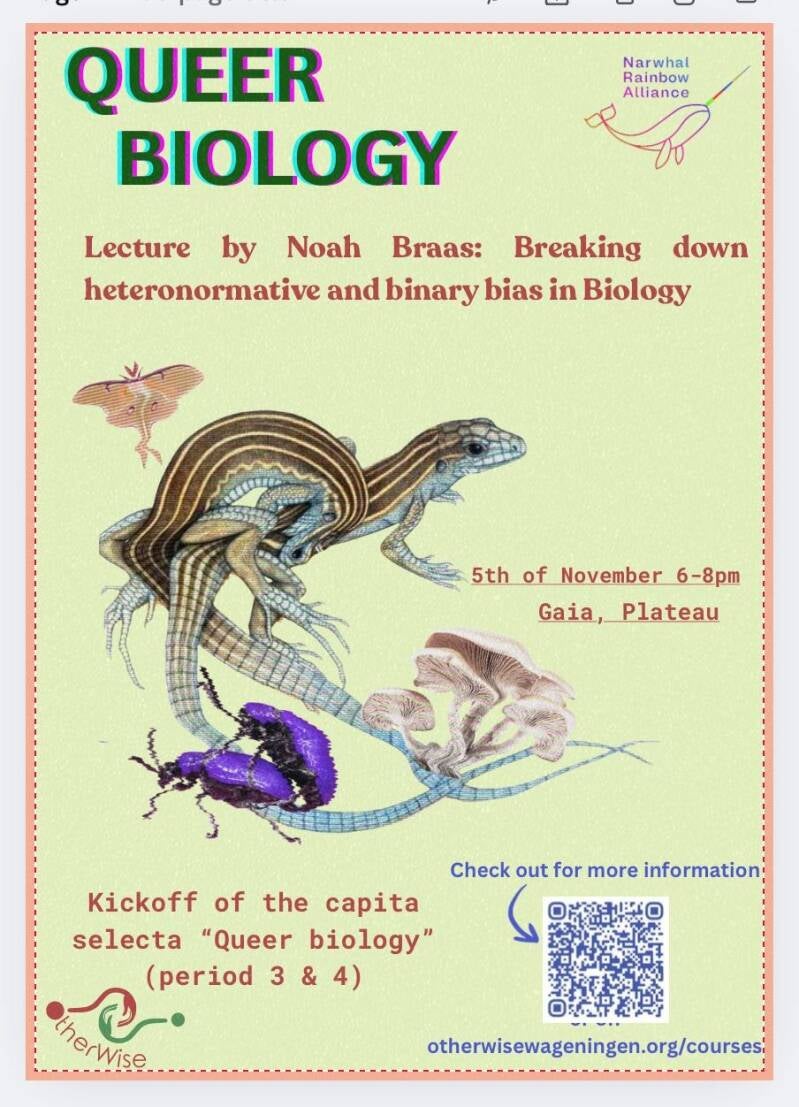
We’ll kick off this capita selecta with the Narwhal Rainbow Alliance, introducing what the course will be like. The Narwhal Rainbow Alliance is a not-for-profit committed to protecting biodiversity and promoting diversity. Their mission lies in bringing more awareness of the queerness of the nature, both as a means to support LGBTQIA+ community and biodiversity challenges. By using examples from diversity in nature the Narwhal Rainbow Alliance aims to promote conversations in schools about sexuality, gender and inclusion.
Re(story)ing Peace with music and fiction
About the facilitator
Chihiro invests in collaborations and is most happy when she makes protestmusic with others.
She prefers to approach the domain of climate justice often tread upon with dry information with radical imagination and focuses on healing practices that are both physical, psychological, spiritual and collective. Her work aims to enable journeys of overcoming intergenerational trauma, healing economic-political wounds and a rediscovery of wholesome freedoms. Besides her primary muscle in decolonial discourse in climate crimes and environmental justice, Geuzebroek is excited about embodied creative practices, reading and peace fiction. She is interested in (her)stories told by lesser known agents of change – and collectives – that inspire in system change struggles and that push the envelope for post-capitalist realities.
Find more about her on her website: https://chihiro.nl/
Date: 4 November
Time: 17:30 - 19:00 (with vegan dinner at 19:00)
Location: Old library, Clockhouse (Generaal Foulkesweg 37, Wageningen)
About the workshop
In this workshop we'll lean into listening, watching and feeling the magic of music/videoclips to sense our individual and collective imagination for decolonial multispecies peace. Not sure what decolonial peace is? Join the workshop and get a playful feel for it.
Set up: we'll use three videoclips as prompts for dream journaling. Afterwards, we will do an exercise in buddy pairs and reflect as a group. In a political economy that drains your energy, this workshop is not set up to be 'productive' but to simply fill your cup a little bit. And maybe find some grounding in what is really calling for collective care practices.
Questions before the event or accessibility needs? Email us at otherwise@wur.nl
We will send you a confirmation email one week before the event!
Embodying
Trans-Feminist Futures
Workshop
Date: Oct 18, 2025
Time: 14:00 - 17:00
Place: Old library, Clockhouse (Generaal Foulkesweg 37, Wageningen)
About the workshop
No Dance background required!
A Workshop of movement, Memory & More-Than-Human Kinship. It invites participants to where embodiment becomes a portal to memory, myth, and transformations. Rooted in trans-feminist and decolonial perspectives, we approach the body as a host of ancestral wisdom—an archive of movement, story, and possibility.
Participants will explore strategies for care, deepen their sensitivity to interconnection, and gather tools for visionary activism.
Islands of rest and reflection will be available for participants at anytime. Expect chocolate, make-up, and tea!

About the facilitator
iSaAc Espinoza Hidrobo is an Ecuadorian performerx, choreographer and violinist based in Cologne. Her works deal with transdisciplinary constellations and experimental quests of real- time composition, decoloniality, anticolonialism, queerness and ritualism empowering local activism. She is the artistic director and funder of the "maiskind" community in Cologne. Her Solo and collaborative works have been featured in prestigious locations throughout Europe & the Abya-Yala - Americas.
Instagram: @iSaAcEspinozaHidrobo
Sign up here: https://forms.gle/pLGDe2khc4veRh6aA
Questions before the event or accessibility needs? Email us at otherwise@wur.nl
We will send you a confirmation email before the event!
Will boys be boys??

Details
Date : Sunday, June 22nd
Time : 15.00 - 22.00
Location : Nude Toekomst, Mennonietenweg 15a
Languages : EN/NL
Organized by : Otherwise, Thalia, RUW
Will boys be boys?? A feminist exploration of masculinity
Everyone has preconceived notions and beliefs about masculinity and femininity. We have picked them up simply by growing up; through family, friends or bullies, education, by what we hear and see in popular culture – you name it. Often, people find it difficult to talk about these concepts. Let's come out and say that it doesn't have to be. Nothing has to be predefined – things are what we make them! Join us for this event and let's explore masculinity together. For this event we will come together to be curious about our own beliefs and behaviors, and to reflect on our preconceived notions. What does it mean to be masculine? How do we openly address and celebrate our identities? How can we become better at recognizing toxic behavior? Questions like these (and many more) will be explored through theater and sharing circles. Dinner will be provided, and in the evening, we will enjoy a drag performance. We want to welcome people of all ages and genders, regardless of whether they have been socialized as men, women or anything else, to join the discussion.
Workshop: the Atlas of Return

Join us for ''The Atlas of Return", a workshop with Weaving Realities arts collective!
19th June 2025, 3 - 5 PM
At Gaia Plateau (1st floor)
In this embodied workshop, led by Yuchen Li, we explore the intimate connections between memory, food, and land through the practices of senti-pensar (thinking-feeling) and corpo-territorial cartografía (body-territory mapping). Drawing on ancestral knowledge and somatic awareness, participants will be guided through a meditative, mindful experience with food—engaging the senses to awaken memory and presence.
From this grounded encounter, we move into a process of mapping our bodies as our first territories—bodies inseparable from the living, breathing lands we inhabit. Guided by the cardinal directions, we invite a reverent return to the elemental coordinates that orient us in relationship with Earth and each other.
This practice invites reflection on food not only as nourishment but as a vessel of ancestral memory, cultural coordinates, and seeds for reimagining relational worlds. In a time when food systems are increasingly abstracted and commodified, this workshop offers a space for re-rooting in embodied knowledge, memory, and belonging.
✏️Sign up
https://forms.gle/iHxbtCLPVQF8n4Jy9
This is part 3 of the seminar series in conjunction with the course RSO58806 Beyond Sustainability: Theorizing post and anti-capitalist food futures. The seminar series is open to the university community, and co-organized with Otherwise.
Frontline Voices: Resistance Against Glencore

Frontline Voices: Resistance Against Glencore ✊
Get ready for a powerful session that brings the global fight for justice right to our doorstep.
On their way to the UN Human Rights Week in Switzerland, Julio (Peru) and Inés (Colombia) — frontline defenders of land, nature, and human rights — will make a stop in the Netherlands to share their firsthand stories of resistance against mining giant Glencore.
Glencore, one of the world's largest multinationals, has left a trail of ecological destruction and human suffering in its wake. But communities are rising. And they're not backing down.
🔊 Hear directly from those who are leading the resistance.
💥 Learn how extractivism threatens lives and land — and what can be done.
🤝 Discover ways you can stand in solidarity.
📍Don't miss this rare opportunity to connect with global changemakers on the ground.
🗓 June 17, 12:00h-13:30h
📍 Forum, Room: P0631
📣 Open to all
💬 Q&A and discussion
🌟 Attention !
In case you are not familiar with Spanish, please bring headphones and a device (laptop, phone,..) so we can do live translation (spanish-english).
See you there!
Queer Ecologies - or how to become more-than-one

Welcome to: Queer ecology - or how to become more-than-one
with Gizem Şentürk
What is natural? Where is nature? What does queer have anything to do with it? Queer ecology offers an intersectional perspective on nature, more-than-human and more all while deconstructing binaries. It also shows the inherent interconnectedness between things: be it the bacteria living on human gut, or mushrooms in a forest or humans living in the web of a city. In this lecture, we will look into how queer ecology as a critical theory came about, with its connections to ecofeminism and queer theory. We will also focus on symbiosis as a queer phenomenon: Through a journey from science fiction to science fact, we will look into popular media like Star Trek, symbiogenesis theory, and connect them to philosophical questions on the individual – or the lack there of.
Date: 6 June, 2025
Time: 16:00-18:00
Place: Gaia Plateau, the 1st floor, Wageningen University
Exchanges of Capoeira Angola: Resistance, Ancestry, and Becoming through the Ground

When? 20th May, 5.30-7.30 PM 27th May, 3-5 PM (note it previously said 6-8 PM! This was wrong!)
Where? both at the Dance room at the Clockhouse(Generaal Foulkesweg 37 Wageningen)
Register here: https://forms.gle/fnYgtFeSx3cGiAEXA
In these two workshops we will exchange through music, movement and conversation as is custom in the practice of Capoeira Angola. As such we will explore the capacity of our full being (hands, feet, hearts, heads) to navigate complexity, trouble and connection. For both of these workshops we extend the invitation to be open to experience something new, something strange, something 'other', to not reject this from a position of superiority or a desire for control, but rather to play with what it conveys to you, to be open to its significance and therewith its potential to negate the preconceived. How might we navigate complexity differently, inviting play, ritual and comradeship into resistance movements? What can we learn from ancestry and what ancestor do we want to become?
In the first workshop ( 20th of May ) the focus is on establishing a first contact with Capoeira Angola's movements, rhythms and making contact with the ground. For the second workshop ( 27th of May ) we are honored to have mestre Marcelo Angola joining us from Bahia, Brazil. During this workshop we go into the origins of Capoeira Angola, ancestrality, and relations between Europe and Brazil.
About Capoeira Angola:
Capoeira Angola emerged in the 16th century with the arrival of enslaved African populations in Brazil. These practiced and trained Capoeira at the senzalas, small huts made of palm, located inside the plantations. Capoeira was a way to affirm their rights and train rebellion in order to fight for liberation from their oppressors. Some escaped to the jungles and with the passing of the years, small illegal communities were created (known as quilombos) where they finally reached their spiritual liberty. Capoeira Angola continued to evolve as a mixture of art, dance, fight, culture, education, and as a philosophy and way of life.
Curious?
Register here:
https://forms.gle/VXGE2K28E1UWYfHd7
Cultivating relationships of reciprocity - Rooting Deeper

Illustration credits: Rithika Merchant
On May 30 and 31, 2025, the first edition of the Rooting Deeper Festival will take place at Proeftuin Ede. Celebrate with us our connections to the land, to good, just food and to its many cultures. We come together against oppression and fascism, and for peace, life and freedom. On 30 May from 13.30 onwards there are bike excursions to agroecological farms, sign up here. On 31 May from 14.00 onwards, you can enjoy music, spoken word, storytelling by the fire, arts, workshops (in English too), local food and drinks, a crafts market, and a cool children's program. Location: Proeftuin Ede, a 10 minute walk from Ede-Wageningen train station. Get your (free) ticket through the link here : https://agroecologie.nl/rootingdeeper/
OtherWise will be giving a workshop on the 31st of May, from 18:30 - 19:00 on celebrating relations of reciprocity with the more-than-human world. Expect embodied exploration, a call to connect with our animal ancestors, a collective art-making journey, and some more magic in the air!
Bubbling Communities: A half - day workshop on breadmaking, belonging, and building companionship
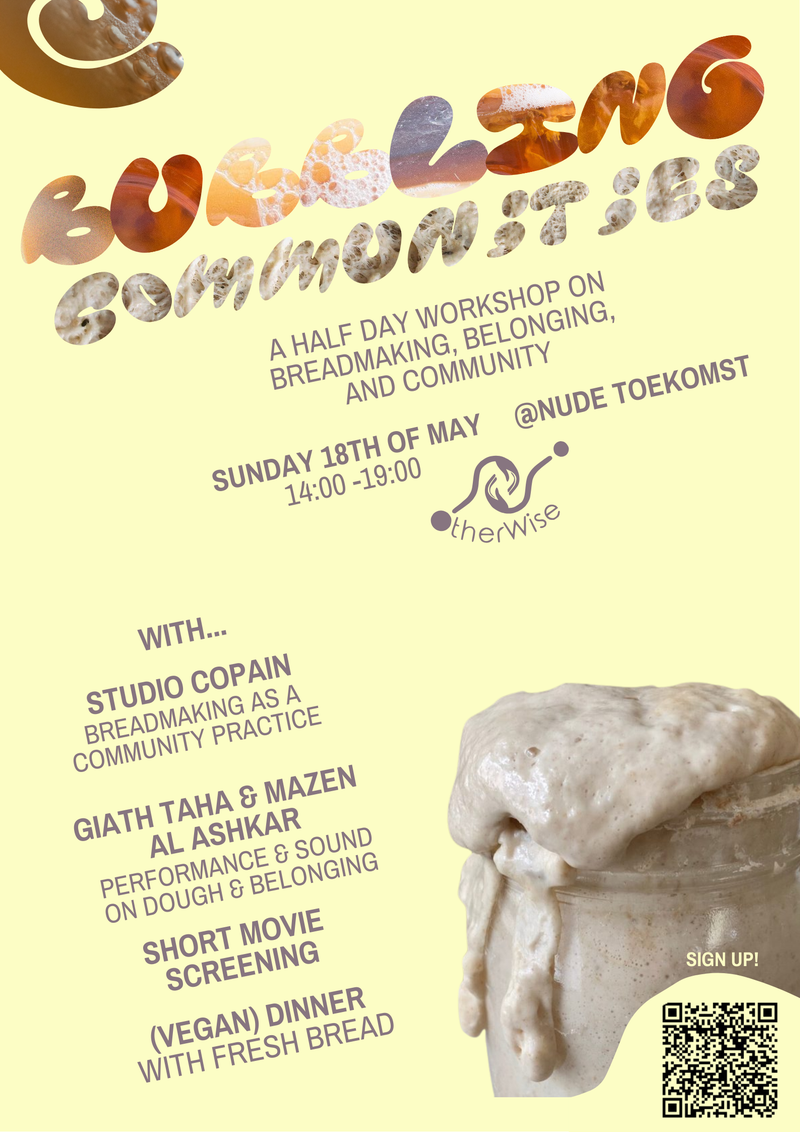
🌟This event will take place on Sunday, May 18th, 2025 from 2:00 PM till 7:00 PM .
Because we aim for creating a sense of community, you cannot join only parts of the workshop.
📍Location : NuDe Toekomst ( Mennonietenweg 15A, 6702 AB Wageningen )
🥗(Vegan) dinner will be shared, so please stick around! See you soon!
Throughout history, breadmaking and other forms of fermentation have played a key role in the building of communities (both bacterial and human). Down to the etymology of the word 'bread', which has the same roots as the word 'companion', food sharing is a paramount and often overlooked aspect of community building.
In this afternoon event, participants will take part in a series of workshops and events on collective breadmaking, short movie, and arts performance. We ask of one another, how can we find, build and feed community, and what role can food play in it? What does it mean to belong when kneading a dough becomes a political act in itself?
Studio CoPain will guide us on communal bread-making practices, bringing their expertise as artists and bread bakers. We will shape, decorate, and bake bread together.
Giath Taha's performance “Restless Dialogue” uses sourdough as a living medium to explore themes of displacement and political reality. A dialogue unfolds between the gestures of kneading and folding and the evolving wave textures shaped by sound artist Mazen Al Ashkar. Through this interplay, the performance evokes both ancestral care and sound tension.
Film screening + discussion of YINTAH

Movie night: Yintah on the 21st of April
The movie follows the Wet'suwet'en nation that reoccupies and protects their ancestral lands from the Canadian government and several of the largest fossil fuel companies on earth.
Their struggle against the construction of a Gas pipeline continues to this day.
Details
Screening starts at 8pm, on the 21st of April, in the Old Library of the Clockhouse, Generaal Foulkesweg 37. No need to sign up!
Cosmosis: Stories of Soil and Stone

Details
Date: 15th April, 2025
Time: 17:30 start, vegan dinner and discussion at 19:00
Place: Belmonte Arboretum (https://maps.app.goo.gl/3a9JbsWVZmMqWfXXA)
Join us for an evening of immersive storytelling, reflection, and connection to the earth with Stories of Soil and Stone, a Cosmosis Quest exploring our kinship with the land.
Cosmosis is a growing series of audio Quests—guided by me, Paul, storyteller and self-initiated wizard—designed to re-enchant the everyday through stories, soundscapes, rituals, and magic.
The stories we tell shape the world. In these times of crisis, we must unearth ancient wisdom and create new narratives: stories of animism and ecocentrism: “I dream of a world guided by a lens of stories rooted in the revelations of science and framed with an Indigenous worldview — stories in which matter and spirit are both given voice.” —Robin Wall Kimmerer
These Quests are a practice, an exercise to shift perception and see the world around us differently. We’ll each embark on this individual audio walk guided by the Cosmosis app, followed by a group reflection over a shared meal.
Download the app here: https://app.cosmosis.quest/download. Please bring headphones and a charged phone. If you would like to borrow either of these, you can tell us in the sign up form.
Questions before the event or accessibility needs? Email us at otherwise@wur.nl
Feminist Radical Quiltmaking

🪡Feminist Radical Quiltmaking Workshop for Women's day🪡
Time to reclaim traditionally 'feminine' 'crafts' for the radical act that they are!
In honor of Women's March, OtherWise and Amsterdam Dyke March are coming together to bring you a Radical Quiltmaking Workshop on March 6, 5:00 PM-8:00 PM💜
📍Location: Clockhouse (General Foulkesweg 37, 6703BL)
Each participant will embroider or paint words and doodles of resistance on themes surrounding feminism.
You will moreover have the chance to learn some simple patchwork techniques!
Together, these patches will form a feminsit radical quilt that we will parade during the Women's March in Wageningen!✊
Materials and snacks will be provided. Just sign up and bring yourself! (Sign up Link) (https://docs.google.com/forms/d/e/1FAIpQLSf1IXjAGOh0haZPLF3K_HP5qc846T8XmvfnWhkxMI0vrY454A/viewform?usp=sharing)
Rest, Embody, Resist (3 part workshop)
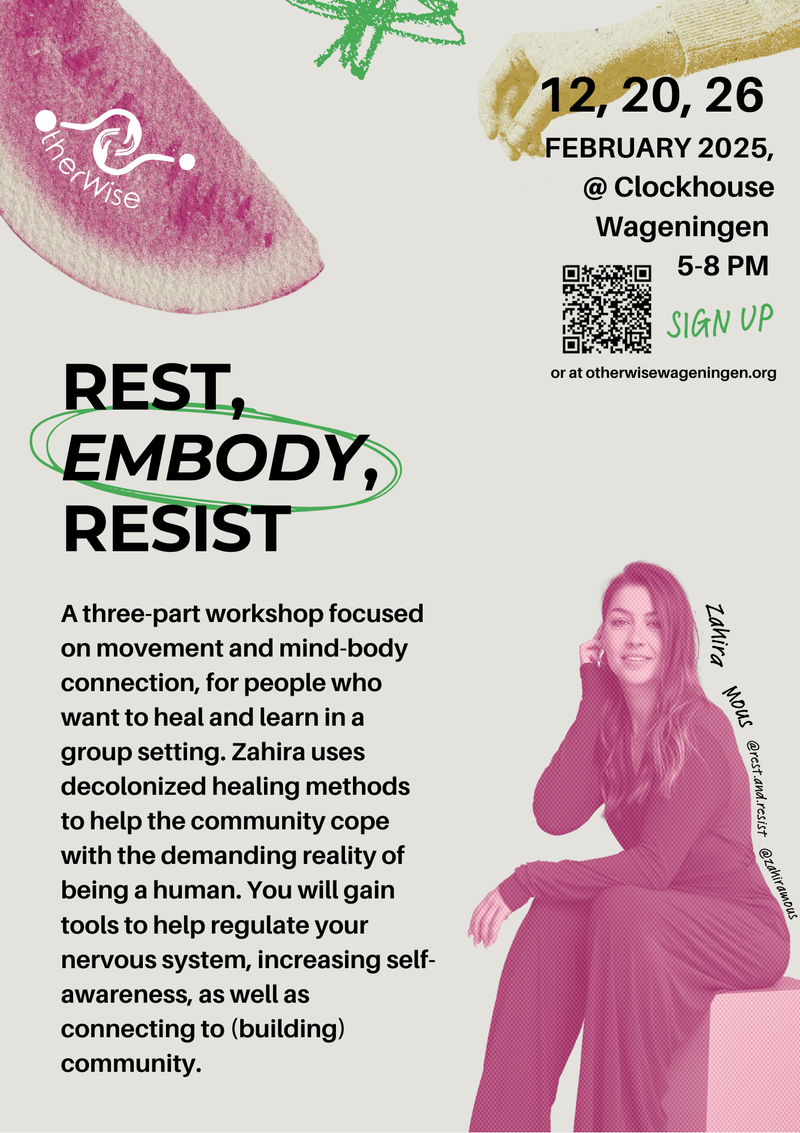
Update: First session starts on the 20th!
Join us for our three-part workshop series: REST EMBODY RESIST with Zahira Mous
Workshop dates: 20, 26 February 2025, from 5-8 pm. As we build up the content and the trust in the group, we generally expect attendance in all three sessions unless communicated with us for certain circumstances.
Location: Clockhouse building Old library (Generaal Foulkesweg 37, Wageningen)
Questions to: otherwise@wur.nl
Sign up: https://docs.google.com/forms/d/1HaczU_P5ne2y48ikmF6uudZU9QmsPGHyZBx7CoSWSJ4/edit
This three-part workshop is focused on movement and mind-body connection, for people who want to heal and learn in a group setting. Zahira uses decolonized healing methods to help the community cope with the demanding reality of being human. Modalities utilized: sharing and listening, EFT, moving from the wisdom of the body, and creativity. It is a three-part workshop series during which we deepen the work each session, diving into layers of our being, making an inner inquiry and creating space within (sometimes questions, sometimes answers). With this work, you'll gain tools to help regulate your nervous system, increasing self-awareness through recognizing your worth, as well as connecting to (building) community. Welcome to REST | EMBODY | RESIST.
For whom?
Rest And Resist emerged as a platform for needing a supportive and safe space for fellow activists and artists fighting for a free Palestine, and beyond. Their work focuses on fighting exhaustion, separation, burnout, harm, and disillusionment in activist movements. If you are longing for a collective space where you can rest with intent to co-regulate, build resilience, supportive networks, mutual care, and trust, this space is for you. As we will use our bodies to move and heal what needs healing, we aim to accommodate bodies of different abilities. If you have any questions or concerns weather this space is for you, please don't hesitate to reach out to us at otherwise@wur.nl .
Poisoning the well: toxic behaviours in Academia
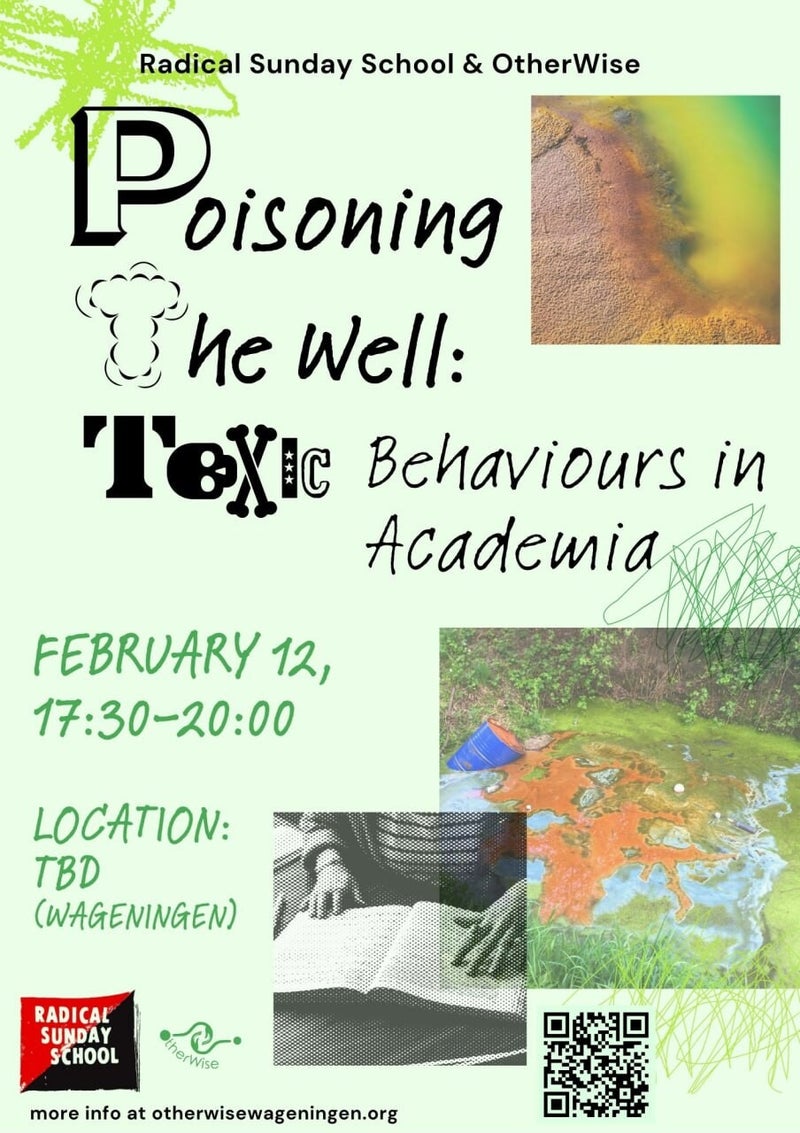
When: Wednesday February 12 @17:30
Where: Dance room, WUR Clockhouse (Generaal Foulkesweg 37, 6703 BL Wageningen)
There are several reasons why we enroll at a university and there are several ways in which a university education contributes to our personal and professional development. A degree can open doors to many different career paths, classes can be a great opportunity to meet new people, and some university professors are great mentors. However, the same classrooms can impact us in less constructive ways: since we are compelled to prove we are better, smarter, and more special than those around us.
Tonight, we will explore how universities shape us through discussing public intellectuals, people who make a living by being visibly smarter and more special than others. (Self-reflection can only be truly effective, if we ask ourselves the toughest questions, like, do we have something in common with Jordan Peterson?;))
Vegan snacks and tea will be provided :)
Towards Decolonial Futures

Time: 5th Dec 2024, 17.00 - 19.30 h
Location: Clockhouse (Generaal Foulkesweg 37, Wageningen), room: Old Library
Join this dynamic and reflective workshop with Niki & Katha, where we will explore the themes of decoloniality, accountability, and responsibility. Using the "7 steps forward, 7 steps backward or aside" framework, we will open up a space for awareness, self-reflection, and meaningful conversation.
This workshop will invite participants to examine the inner work required to confront and unlearn colonial mindsets, especially for those of us living in the Global North. Through dialogue, movement, and community-building, we will raise essential questions of accountability:
What does it mean to take accountability for historical and ongoing inequities? How do we navigate our roles in systems of power and privilege? What does this inner work of deconstruction look like?
Together, we reflect on power, privilege, complexity, and positionality, creating an inclusive and brave space for everyone to share their perspectives. The aim is to foster a sense of connection and community that will inspire participants to carry this work forward.
This is an invitation to move together—whether we take steps forward, backward, or aside—as we engage in this collective journey.



